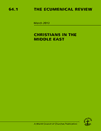
ECUMENICAL REVIEW
Scope & Guideline
Connecting Scholars in the Realm of Faith
Introduction
Aims and Scopes
- Ecumenical Theology and Dialogue:
The journal explores various theological perspectives that contribute to ecumenical dialogue, emphasizing the importance of unity among different Christian denominations. - Social Justice and Inclusion:
It addresses contemporary social issues such as racism, gender justice, and ecological concerns, reflecting a commitment to promoting justice within and beyond the church. - Interfaith Engagement:
The journal emphasizes the significance of interreligious dialogue, exploring how Christianity interacts with other faith traditions to foster mutual understanding and respect. - Historical and Contemporary Ecumenism:
It examines the historical developments of ecumenical movements and their relevance to modern ecclesiastical and societal challenges. - Cultural Contextualization of Theology:
The journal encourages discussions on how theology can be expressed in culturally relevant ways, particularly in the context of global Christianity.
Trending and Emerging
- Anti-Racism and Social Justice:
The journal has increasingly focused on themes of anti-racism and social justice, addressing the church's role in combating discrimination and promoting inclusivity within and outside ecclesiastical contexts. - Ecological Theology:
There is a growing emphasis on ecological issues, with papers addressing the intersection of faith and environmental stewardship, reflecting a broader concern for creation care. - Gender Justice and Intersectionality:
Emerging discussions on gender justice highlight the intersectional approach to theology, emphasizing the experiences and voices of marginalized groups, particularly women and LGBTQ+ individuals. - Indigenous and Contextual Theologies:
The journal has begun to incorporate more indigenous perspectives and contextual theologies, recognizing the importance of local narratives and lived experiences in theological discourse. - Digital and Technological Engagement:
With the rise of digital communication, there is a trend toward exploring how technology influences religious practices and interfaith dialogue, indicating a modern approach to traditional theological discussions.
Declining or Waning
- Traditional Doctrinal Debates:
There appears to be a waning interest in traditional doctrinal disputes among denominations, with fewer papers focusing solely on historical theological controversies. - Eurocentric Perspectives:
As the journal increasingly embraces global and diverse voices, discussions centered primarily on European contexts and perspectives have become less prominent. - Institutional Ecumenism:
The focus on formal church structures and institutional ecumenism has diminished, as there is a growing emphasis on grassroots movements and community-based approaches. - Historical Commemorations:
While historical reflections remain important, there has been a noticeable reduction in the number of papers dedicated solely to commemorating past ecumenical events without a contemporary application.
Similar Journals

Studia Theologica-Nordic Journal of Theology
Illuminating Diverse Perspectives in TheologyStudia Theologica-Nordic Journal of Theology, published by Routledge Journals, Taylor & Francis Ltd, serves as a vital platform for scholarly discourse in the field of Religious Studies. With an ISSN of 0039-338X and an E-ISSN of 1502-7791, this esteemed journal has been contributing to theological scholarship since 1947, exploring diverse theological perspectives and contemporary issues within religiosity. Its impressive categorization in the Q2 quartile underscores its significance, while a ranking of #213 out of 644 in the Scopus database places it well within the 66th percentile in the realm of Arts and Humanities. Although not open access, the journal provides a comprehensive repository of research articles, reviews, and critical essays that engage researchers, professionals, and students alike. Addressing both historical and modern theological debates, Studia Theologica fosters a rich academic environment for innovative thought and rigorous inquiry, making it an essential resource for anyone engaged in the study of theology today.
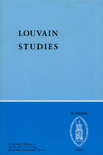
Louvain Studies
Exploring the Depths of Philosophy and FaithLouvain Studies is a distinguished academic journal published by PEETERS, specializing in the nuanced fields of Philosophy and Religious Studies. Established in 1977, the journal serves as a critical platform for scholarly discourse, contributing to the understanding and analysis of philosophical and theological concepts through its rigorous peer-reviewed articles. With an ISSN of 0024-6964 and an E-ISSN of 1783-161X, the journal is based in Leuven, Belgium, providing a unique European perspective on an array of interdisciplinary studies. Although not openly accessible, it remains a vital resource for researchers and students, boasting rankings within the 30th percentile for Religious Studies and 26th percentile for Philosophy in the Scopus database. The journal’s commitment to academic excellence is evident in its quartile rankings, placing it among the noteworthy publications in these fields. Louvain Studies fosters dialogue, challenges conventional thought, and encourages innovative research, making it an essential reference for anyone invested in the philosophical and religious discourse.

Bogoslovska Smotra-Ephemerides Theologicae Zagrabienses
Bridging Faith and Academia for a Deeper UnderstandingBogoslovska Smotra-Ephemerides Theologicae Zagrabienses is a prominent journal in the field of Religious Studies, published by the esteemed University of Zagreb's Catholic Faculty of Theology. Since achieving Open Access status in 2008, this journal has become an essential resource for scholars, researchers, and students alike, facilitating the dissemination of theological scholarship and discourse. With an ISSN of 0352-3101 and an E-ISSN of 1848-9648, the journal covers a wide range of topics within religious studies, contributing significantly to the academic community, particularly in Croatia and Central Europe. In 2023, it was classified within the Q3 quartile, ranking #502 out of 644 in Scopus under the Arts and Humanities category, which highlights its growing influence in the discipline. The journal's commitment to fostering dialogue and inquiry within theology makes it a vital platform for innovative research from 2011 to 2024 and beyond. For those interested in the intersection of faith, culture, and theological reflection, Bogoslovska Smotra is an indispensable publication that continues to shape the landscape of religious studies.
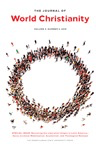
Journal of World Christianity
Connecting Historical Contexts with Contemporary Issues in ChristianityJournal of World Christianity, published by Penn State University Press, is a distinguished academic journal that serves as a vital platform for scholarship in the field of global Christianity. With an ISSN of 2377-8784 and E-ISSN 1943-1538, this journal aims to explore the diverse expressions, cultural contexts, and historical developments of Christianity around the world. By fostering interdisciplinary research, it invites contributions that encompass theology, sociology, history, and religious studies, addressing both contemporary issues and historical trends. Although currently not open access, the journal maintains a commitment to high-quality peer-reviewed research, making significant contributions to academic discourse. Scholars, practitioners, and students alike will find valuable insights in the Journal of World Christianity, reflecting the complexities and dynamism of global faith traditions.
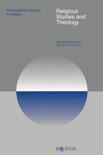
Religious Studies and Theology
Exploring the Intersection of Faith and Contemporary IssuesReligious Studies and Theology is a distinguished academic journal published by EQUINOX PUBLISHING LTD that has been contributing to the discourse in the field since its inception in 2012. Operating under the ISSN 0829-2922 and the E-ISSN 1747-5414, it aims to foster scholarly dialogue and present original research that advances the understanding of religious thought, practice, and its intersection with contemporary issues. Although it currently resides in the Q4 category of Religious Studies, the journal is poised for growth and invites contributions that explore diverse perspectives and methodologies. The journal is based in the United Kingdom and remains committed to maintaining rigorous academic standards while promoting accessibility in religious studies. Researchers, educators, and students are encouraged to submit their work to Religious Studies and Theology as it strives to fill critical gaps in the literature, offering a platform for innovative ideas and comprehensive discussions in this dynamic field.

Logos & Pneuma-Chinese Journal of Theology
Navigating the Evolving Landscape of TheologyLogos & Pneuma-Chinese Journal of Theology, published by LOGOS & PNEUMA PRESS, serves as a vital platform for theological discourse and research within the context of Chinese religious studies. Established in 2008 and continuing to contribute valuable insights up until 2023, this journal holds a Q4 ranking in Religious Studies for 2023, illustrating its emerging influence within the field. Although it currently lacks an impact factor and open access options, the journal provides a unique perspective on contemporary theological issues and practices relevant to scholars and practitioners engaging with Chinese Christianity and other religious traditions. It is an essential resource for researchers, students, and professionals seeking to enrich their understanding of the interplay between religion and culture in a rapidly evolving social landscape. Located in the heart of the New Territories, China, the journal invites submissions that reflect a broad range of theological inquiries, encouraging critical engagement and scholarly dialogue.

Revista Pistis & Praxis-Teologia e Pastoral
Connecting Scholars and Practitioners in FaithRevista Pistis & Praxis-Teologia e Pastoral, published by the Pontificia Universidade Catolica do Parana (PUCPR), is a distinguished open-access journal that has been contributing to the fields of theology and pastoral studies since 2009. With its ISSN 1984-3755 and E-ISSN 2175-1838, this journal offers a platform for scholarly articles that explore contemporary issues in theology, ethics, and church practices. Situated in Curitiba, Brazil, it aims to foster dialogue and reflection among researchers, practitioners, and students alike. The journal’s commitment to accessibility and academic rigor positions it as a significant resource for those engaged in the study of theology and pastoral care, making it essential reading for anyone seeking to deepen their understanding of these vital fields.

Communio Viatorum
Navigating the Depths of Human Thought and BeliefCommunio Viatorum is a distinguished academic journal published by UNIV KARLOVA PRAZE that serves as an essential platform for the exploration of topics within the fields of History, Philosophy, and Religious Studies. With an ISSN of 0010-3713, the journal has made significant strides since its inception, converging its scholarly content from 2011 to 2023. Despite being classified in the Q4 category for the year 2023 in all three relevant academic categories, it presents a valuable opportunity for researchers and scholars to disseminate their findings and engage with critical insights from a diverse array of perspectives. The journal does not currently offer open access, emphasizing its commitment to maintaining rigorous academic standards. The address for correspondence is located at EVANGELICKA TEOLOGICKA FAC, CERNA 9, PO BOX 529, PRAHA 1 CZ-115 55, CZECH REPUBLIC. Despite its challenges in ranking—#1368 in History and #515 in Religious Studies—Communio Viatorum continues to contribute to ongoing dialogues and scholarship, making it a noteworthy journal for students, professionals, and researchers pursuing knowledge in these interconnected domains.

Nova et Vetera-English Edition
Exploring the intersection of historical and contemporary theological insights.Nova et Vetera-English Edition is a distinguished academic journal published by Catholic University of America Press, focusing on the interdisciplinary studies of religious thought, moral philosophy, and theological inquiry. With its ISSN 1542-7315 and E-ISSN 2470-5861, the journal serves as a vital platform for scholars, professionals, and students aiming to explore contemporary issues through a lens of historical and modern scholarship. Although it does not currently offer open access, the journal's rigorous peer-reviewed articles are pivotal for advancing discourse in theology and philosophy, providing fresh perspectives on both classical and contemporary topics. The impact of Nova et Vetera in the academic community underscores its commitment to fostering a deeper understanding of faith's role in today’s world, making it an essential resource for anyone engaged in the study of religious and philosophical traditions. The journal is located at 620 Michigan Avenue NE, Admin Bldg Room 303, Washington, DC 20064, allowing it a prominent presence in the heart of one of the nation's leading centers of theological thought.
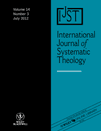
International Journal of Systematic Theology
Cultivating a vibrant dialogue among theology scholars worldwide.International Journal of Systematic Theology is an esteemed publication dedicated to advancing the discourse in the field of religious studies, primarily through rigorous theological analysis and scholarly engagement. Published by WILEY in the United Kingdom, this journal has established itself as a significant contributor to the academic landscape since its inception in 1999. With a commendable Scopus ranking in the 54th percentile within its category and designated as Q2 in the 2023 quartiles, it provides a platform for cutting-edge research that explores systematic theology's methodologies, theories, and applications. While it does not currently offer open access, the journal remains accessible to a wide readership of researchers, professionals, and students striving to deepen their understanding of theology and its implications in contemporary contexts. Located at 111 River St, Hoboken, NJ, the journal continues to foster an intricate dialogue among scholars and practitioners in the field, ensuring its relevancy and impact in shaping theological scholarship through to 2024 and beyond.